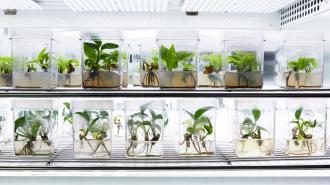Bioengineers design a new plant to purify air faster than nature
Air pollutants are common in our homes and offices. In fact, according to the EPA, the concentration of air pollutants indoors is typically two to five times higher than outdoors.
These pollutants come from paints, cleaning supplies, the wood in our furniture, and appliances we use daily, and they include such irritating compounds as benzene, toluene, xylene, and formaldehyde. Yes, formaldehyde is infamously the chemical used to preserve dead bodies, but it’s also used to manufacture a variety of common products such as plywood.
While plenty of tech companies are displaying their latest air purifiers at CES 2024, these devices can only siphon fine particles from the air, such as dust and mold spores. Gasses and organic compounds slip through their HEPA filters. Thankfully, nature has already designed an air purifier with the tools necessary to filter out these pollutants: plants.
Unfortunately, plants have yet to evolve to keep up with the microscopic workload that the modern indoor living space presents. To purify the air of your average living room, you’d basically need to turn it into a greenhouse and even then you’d miss the organic compounds that plant leaves haven’t evolved to filter.
To solve this problem, Neoplants, a biotech startup, has bioengineered a popular leafy houseplant, called Devil’s ivy or pothos vine, to be 30 times more efficient than a traditional plant at filtering harmful organic compounds from the air. At CES 2024, Freethink talked to the founders about how they did it and what might be coming next.
Designing a new plant
Lionel Mora and Patrick Torbey, co-founders of Neoplants, had the idea of building an organism with, what Mora describes as, “virtuous function.” In other words, they wanted to use synthetic biology to add positive functions that could have a positive impact on the environment. They were surrounded by plants when they had the conversation, and so, they thought they could add such a function to a plant to help improve the air.
Over several years, the Neoplants team modified pothos plants (Epipremnum aureum) to do just that, and they managed this by bioengineering the species on two levels. The first level: they recoded the plant’s DNA to enhance its natural ability to capture and eliminate airborne pollutants.
Take formaldehyde. The pothos plant is one of the few plants with the enzymes necessary to break down formaldehyde; however, the species does so at a low level. The Neoplants team tweaked the plant’s genome to increase the expression of those enzymes. They then added an enzyme found in an extremophile bacteria that allows the plant to take the broken-down formaldehyde and convert it into carbon dioxide, which the plant’s natural metabolism then converts into glucose. Essentially, the plant now pulls a toxic substance out of the air and turns it into sugar.
The second level is the plant’s microbiome. “We take microorganisms that exist in nature that are already really good at capturing pollutants, and we evolve them through artificial evolution, optimizing the selection for air purification. Over rounds of evolution, we get strains that are incredibly strong at capturing and metabolizing these pollutants,” Mora tells Freethink.
Like humans, Mora points out, microorganisms such as bacteria live inside and outside of plants’ “bodies.” These microorganisms help the plants sustain their biological functions, and when the bioengineered versions are introduced to a pothos plant through Neoplants’s “Powerdrops” — just like a monthly dose of plant food — they supercharge the plant’s ability to metabolize specific pollutants.
Finally, Neoplants designed a pot that helps maintain the plant’s health while maximizing airflow between the room and the substrate.
“What we are building is a nature-based system that can tackle this issue without having to use electricity or a plug-in,” Mora says. “It’s really opening the door to what synthetic biology and nature can do, which is very powerful. Obviously, it’s early days, but I think we are going to see phenomenal progress in this field.”
The team has written a white paper to present its research to the public.
Quality air and more
Curious why they chose a pothos plant instead of another indoor favorite, like a succulent or inch plant?
In addition to having a head start on enzyme production, the pothos’s waxy leaves and high growth rate allow it to absorb a lot of organic compounds for its size. It also doesn’t produce pollen or seeds, so it won’t accidentally spread into the wild. And it’s super easy to care for. Even those of us without green thumbs stand a chance of not only keeping this robust plant alive but enjoying it for decades.
However, Mora adds that the technologies the Neoplants team developed can theoretically be applied to other species, so other supercharged indoor plants may be coming one day. Until then, Neoplants aims to begin shipping their bioengineered pothos plants in North America early this year and is currently taking preorders.
What we are building is a nature-based system that can tackle this issue without having to use electricity or a plug-in.
Lionel Mora
Of course, plants come with other advantages, too. Research suggests that working or studying in a room with plants has been shown to help reduce stress, sharpen attention, boost productivity, and, in general, have a therapeutic vibe. (And no, plastic plants did not show the same results.)
So while the Neoplants team has done some incredible work to give plants an incredible “virtuous function.” It’s really just a bonus to what nature already provides.
